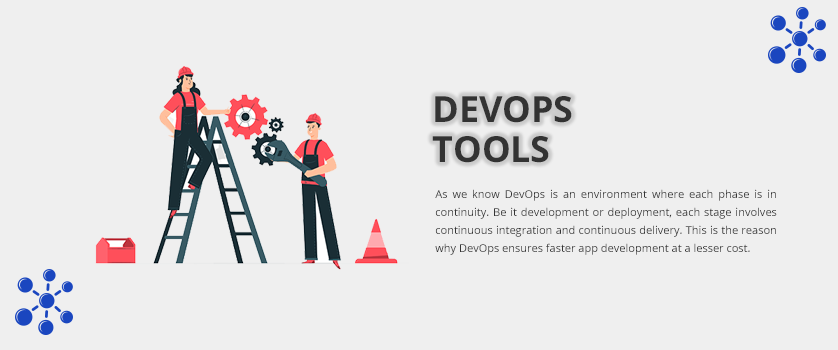


DevOps Tools
As we know DevOps is an environment where each phase is in continuity. Be it development or deployment, each stage involves continuous integration and continuous delivery. This is the reason why DevOps ensures faster app development at a lesser cost.
But is it all?
No, the complete DevOps lifecycle includes a list of tools that ease the development.
If you want to know about those DevOps tools, then this post is for you. In this post, we have listed down the best DevOps tools that address major processes like collaboration, configuration management, bug detection, security, etc.
Like GitHub, Bitbucket offers easy collaboration during the software development life cycle. Lots of its features resemble GitHub, but easy integration of tools like Trello, Jira, inbuilt CI/ CD functionality makes it the first choice for most of the DevOps teams.
It is helpful in early bug detection. It’s a free tool that supports many languages like Ruby, JavaScript, iOS, etc., and has customizable inbuilt SDKs to support development for many languages and frameworks. Every line of the code is continuously scanned and if any error is found, apart from sending the notification, it also suggests ways to solve it with a single click.
This one is the best tool for collaboration among the team members. It helps DevOps teams to make swift iteration to the code. When an iteration happens, the notification of the same is sent to the other team members. All the changes done to the code are registered in the branched history of this tool that helps to make instant rollback once an error or bug is found.
This tool is considered the most effective configuration management tool in the IT industry. Unlike other tools, it doesn’t exploit background resources yet offers a sophisticated outlook. The best feature of this tool includes making new changes in the current system. Apart from that, new machines can also be configured with this tool easily. With these two incredible features, an IT organization can cut the replication cost without compromising on scalability.
It is an open-source network monitoring tool preferred by the world’s top organizations. It monitors the network problem caused by overloaded data links or network connection. Plus, it monitors routers, switches, uptime & response time of every node available on the network. All the data related to the network can be accessed in the form of visual representation and reports.
It is famous for managing and working with virtual machines in a single flow. With this tool, the software testing running environment can be shared with other team members and the time involved in testing can be reduced significantly. It saves ample time of setting up configuration and ensures that the applications running environment remains the same on all the systems.
Application’s security is the major concern of the DevOps team that’s why to ensure safety they opt for tools such as Phantom. This tool provides a centralized collaborative environment and keeps the team members updated about the rising security threat. In simple words, if the whole team is monitoring the application’s development, there are fewer chances of ignoring security threats. Some of its features like file detonation and device quarantine make it a priority among the DevOps team to secure applications.
Its containerization features help you run any application hassle-free regardless of the computing environment. The docker container image is a lightweight, standalone unit of the application equipped with code, runtime, system tools, system libraries, and settings. The docker engine helps access these containers even in the remote environment that in turn reduces the infrastructure cost for the organization.
It’s an open-source integration server that automates the complete cycle of the project development. It is a highly customizable tool and offers developers commit code to repository automatically, run test cases, and fetch post-testing reports. Besides this, it notifies the testing team about the potential fault in the build. The best part of this tool is that you can automate most of the tasks involved in SDLC.
It is famous for establishing effective collaboration among the teams. This is the reason why most IT teams around the world use it for seamless communication.
From an early stage of development to release, the DevOps teams need a range of tools. But a DevOps team should know that instead of having numerous tools, the focus should be on picking up the appropriate tools. Hence, in this post, only those tools were mentioned that most IT professionals recommend.